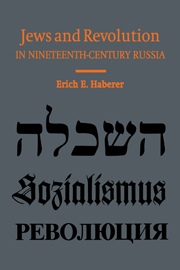Book contents
- Frontmatter
- Contents
- Preface
- 1 Introduction: The beginnings of Russian–Jewish radicalism, 1790–1868
- Part 1 The Chaikovskii circles: Jewish radicals in the formative stage of revolutionary Populism, 1868–1875
- Part 2 The Land and Freedom Party: Jews and the politicization of revolutionary Populism, 1875–1879
- Part 3 The Party of the People's Will: Jewish terrorists of socialist conviction, 1879–1887
- Appendix
- Abbreviations
- Notes
- Bibliography
- Index
Part 3 - The Party of the People's Will: Jewish terrorists of socialist conviction, 1879–1887
Published online by Cambridge University Press: 22 January 2010
- Frontmatter
- Contents
- Preface
- 1 Introduction: The beginnings of Russian–Jewish radicalism, 1790–1868
- Part 1 The Chaikovskii circles: Jewish radicals in the formative stage of revolutionary Populism, 1868–1875
- Part 2 The Land and Freedom Party: Jews and the politicization of revolutionary Populism, 1875–1879
- Part 3 The Party of the People's Will: Jewish terrorists of socialist conviction, 1879–1887
- Appendix
- Abbreviations
- Notes
- Bibliography
- Index
Summary
With the establishment of Narodnaia Volia the ‘Jewish mission’ of infusing Russian revolutionary Populism with a party-political dimension complementing, if not transcending, its social-revolutionary fixation had been accomplished. Still outstanding was the related Westernizing ‘mission’ of introducing social-democratic forms of revolutionary activity into Russia. Although Lev Ginzburg had pioneered the introduction of German social-democratic practices among the St Petersburg Lavrovists in the mid-1870s, it was not until after 1879 that this task was again taken up by Jews: at first by Jewish Chernoperedeltsy, and later on by Jewish Narodovoltsy in their non-terrorist workers' propaganda. This role of the Jews and the fact that they were active in both Chernyi Peredel and Narodnaia Volia raises the intriguing question whether Jewish revolutionaries were actually influenced – consciously or unconsciously – by Jewish motives in joining either the party of political terror or the party of social revolution.
Prima facie, it would appear that considering the ‘political’ and ‘Western’ inclination of socialist Jews they should have altogether switched their allegiance to Narodnaia Volia. This party offered a new form of revolutionary struggle. Advocating a direct confrontation with tsarism, it sought to achieve the immediate goals of civil liberties and political freedom – goals which did strike a responsive cord among all progressive minded Jews. As a matter of fact this was the principal reason why, in the 1880s, Narodnaia Volia became the focal-point of Jewish identification with revolutionary Russia. But such an identification, and corresponding shift towards Narodnaia Volia, was not obvious in the beginning of the decade when Chernyi Peredel still claimed the loyalty of many Jews.
- Type
- Chapter
- Information
- Jews and Revolution in Nineteenth-Century Russia , pp. 171 - 172Publisher: Cambridge University PressPrint publication year: 1995



